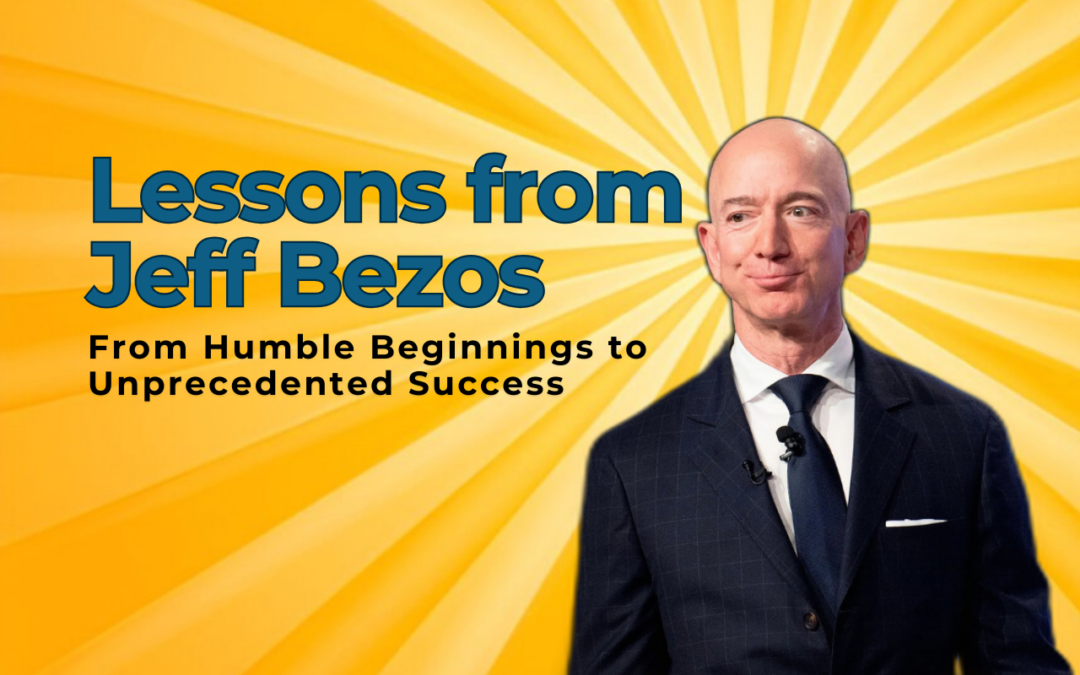Few business leaders in history have reshaped industries, consumer behavior, and entrepreneurship quite like Jeff Bezos. As the founder of Amazon—a company that began as an online bookstore and transformed into a global tech giant—Bezos’ journey offers invaluable lessons for entrepreneurs. This blog dives deep into his path, from the early days to building a trillion-dollar empire, and outlines the lessons every entrepreneur can learn from his remarkable story.
The Genesis of Amazon: A Bold Leap
Jeff Bezos was born on January 12, 1964, in Albuquerque, New Mexico. From a young age, Bezos exhibited an innate curiosity and passion for innovation. His mother, Jackie, was a teenager when she gave birth to him, and his stepfather, Miguel Bezos, who adopted Jeff, was a Cuban immigrant. This upbringing instilled in Bezos a sense of resilience and adaptability.
After earning a degree in electrical engineering and computer science from Princeton University, Bezos embarked on a career in finance. He worked at firms like Fitel, Bankers Trust, and eventually D.E. Shaw, where he quickly rose through the ranks and became a senior vice president. Despite a promising career, Bezos’ entrepreneurial spirit was ignited by the rapid growth of the internet in the 1990s. Recognizing its potential, he drafted a list of 20 possible online business ideas. Selling books online stood out due to the vast inventory that could be digitized and distributed. In 1994, Bezos left D.E. Shaw and moved to Seattle to start Amazon from a garage.
Jeff Bezos initially funded Amazon using personal savings and investments from his family, particularly his parents, who invested a significant portion of their life savings into the venture. This early support was instrumental in Amazon’s launch and growth.
Key Lessons from the Early Days
- Think Big, Start Small: Jeff Bezos envisioned creating the “everything store,” but he started with books. Entrepreneurs should focus on a manageable niche before expanding.
- Customer Obsession: From day one, Amazon prioritized customer satisfaction. Bezos’ mantra was simple: focus on the customer, and everything else will follow.
- Take Calculated Risks: Leaving a lucrative Wall Street job to start a business in an untested market was a gamble. Entrepreneurs should embrace calculated risks to seize opportunities.
- Leverage Data: Jeff Bezos relied on early internet trends and data to identify opportunities. Entrepreneurs can gain an edge by making data-driven decisions.
Scaling Amazon: Innovation and Expansion
Amazon’s launch in 1995 was met with immediate success. Within its first month, it had sold books in all 50 U.S. states and over 40 countries. By 1997, Amazon went public, raising capital to fuel its expansion. This IPO was a pivotal moment, providing the resources needed to diversify and grow.
The company quickly diversified its offerings, moving into music, electronics, and other categories. By the early 2000s, Amazon had launched game-changing services like Amazon Prime, Amazon Marketplace, and Amazon Web Services (AWS). Prime revolutionized e-commerce with its subscription model, offering fast shipping and exclusive benefits. AWS, on the other hand, capitalized on the growing need for cloud computing, becoming a cornerstone of Amazon’s profitability.
One of the boldest moves was Amazon’s push into hardware. The Kindle e-reader disrupted the publishing industry, while Alexa and Echo devices brought voice-activated AI into millions of homes.
Key Lessons from Scaling
- Embrace Innovation: Bezos continuously disrupted traditional models. AWS, for instance, revolutionized cloud computing, making Amazon a leader in tech services.
- Invest in Long-Term Growth: Amazon often prioritized growth over short-term profits, reinvesting revenue into logistics, technology, and new markets.
- Build Scalable Systems: Bezos’ focus on automation and efficiency allowed Amazon to grow exponentially without collapsing under its own weight.
- Diversify Revenue Streams: Amazon’s ability to generate revenue from multiple sources, including e-commerce, subscriptions, and cloud services, ensured stability and growth.
- Customer Feedback Loops: Bezos emphasized listening to customers to refine and improve products and services.
Bezos’ Leadership Principles
As Amazon grew, Bezos established core principles that defined its culture. These principles were codified into Amazon’s Leadership Principles, which continue to guide the company today:
- High Standards: Bezos demanded excellence and set a high bar for performance. This principle drove Amazon’s reputation for quality and efficiency.
- Bias for Action: Employees were encouraged to take initiative and make decisions quickly, fostering a culture of agility and innovation.
- Frugality: Jeff Bezos maintained a cost-conscious approach, ensuring that resources were allocated efficiently. This mindset helped Amazon survive its early unprofitable years.
- Fail Forward: Jeff Bezos viewed failure as a stepping stone to innovation. While some projects, like the Fire Phone, failed, they paved the way for successful innovations like Alexa and Echo.
- Customer Centricity: Every decision at Amazon was made with the customer in mind, from pricing strategies to product design.
Key Lessons from Leadership
- Be Relentless: Bezos’ focus on continuous improvement and experimentation kept Amazon ahead of competitors.
- Foster a Culture of Ownership: Empowering employees to take ownership drives accountability and innovation.
- Learn from Failures: Failures are inevitable; the key is to extract valuable lessons and adapt.
- Simplify Complex Problems: Bezos often broke down complex challenges into manageable parts, making it easier to execute large-scale initiatives.
Beyond Amazon: Blue Origin and Other Ventures
In 2000, Jeff Bezos founded Blue Origin, a space exploration company with the mission to make space travel accessible. Inspired by childhood dreams and a long-term vision for humanity’s future in space, Blue Origin has focused on developing reusable rocket technology. Its motto, “Gradatim Ferociter” (step by step, ferociously), reflects Bezos’ methodical approach to tackling ambitious goals.
Jeff Bezos also acquired The Washington Post in 2013 for $250 million. Under his leadership, the newspaper adopted a digital-first strategy, leveraging technology to boost readership and revenue. This acquisition highlighted Bezos’ belief in the importance of a free press and his ability to transform traditional industries.
His philanthropic efforts have also grown in recent years. Bezos has pledged billions toward climate change initiatives through the Bezos Earth Fund and launched the Day One Fund to support homelessness and early childhood education.
Key Lessons from Diversification
- Pursue Your Passions: Jeff Bezos ’ ventures reflect his interests, from space exploration to journalism.
- Diversify Wisely: Expanding into different industries reduces risk and opens new opportunities.
- Think Globally: Bezos’ vision extends beyond Earth, showing the importance of a forward-thinking mindset.
- Leverage Technology Across Industries: Bezos applied his tech expertise to innovate in seemingly unrelated fields like media and space.
Lessons from Bezos’ Entrepreneurial Philosophy
- Focus on the Long Term: Jeff Bezos famously said, “Your margin is my opportunity.” He prioritized long-term value creation over short-term gains.
- Relentless Customer Focus: Bezos’ obsession with understanding and meeting customer needs remains central to Amazon’s success.
- Think Big: From starting as an online bookstore to venturing into cloud computing, AI, and space, Bezos always aimed high.
- Embrace Change: The ability to pivot and adapt to market trends has been crucial to Amazon’s survival and dominance.
- Invent and Simplify: Bezos’ commitment to innovation and simplicity drives operational efficiency and customer satisfaction.
- Work Backward from the Customer: Bezos often emphasized starting with the customer’s needs and building backward to develop products and services.
Conclusion
Jeff Bezos journey from a garage in Seattle to the helm of one of the most valuable companies in the world is a testament to the power of vision, determination, and innovation. Entrepreneurs can learn from his unwavering focus on customers, willingness to take risks, and commitment to long-term thinking. As Bezos himself said, “If you decide that you’re going to do only the things you know are going to work, you’re going to leave a lot of opportunity on the table.”
For aspiring entrepreneurs, the lessons from Jeff Bezos ’ success serve as a blueprint for navigating challenges, seizing opportunities, and achieving greatness. Whether you’re starting a small business or aiming to disrupt an industry, Bezos’ principles can guide your journey to success. His legacy demonstrates that with vision, perseverance, and a customer-centric mindset, anything is possible.













